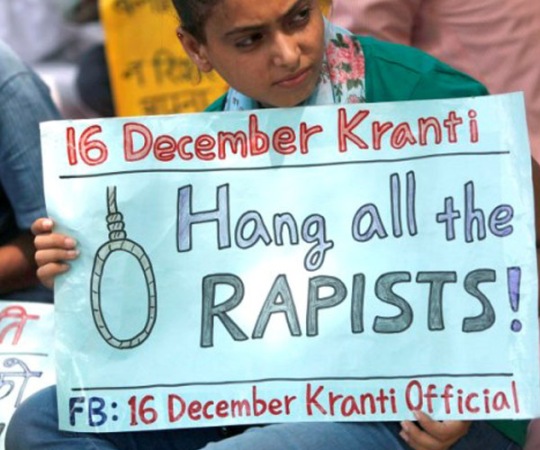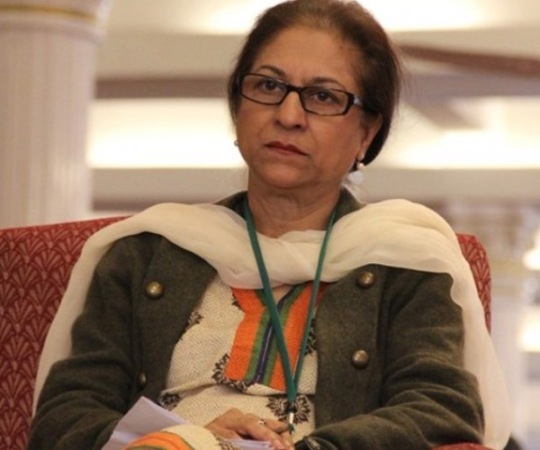By Ayesha Sadaf Khan
October 7 2013
We have all read the headlines: a neighbour held for child rape in Faisalabad, two teenage girls raped and shot dead in Gujranwala and the latest in the never-ending list of gruesome crimes – the horrific attempt of a prayer leader to rape and kill a three-year-old child while she was at a seminary to study.
Such revolting treatment of children in our homeland certainly makes everyone feel sick to their stomachs but one wonders what allowed such a shameful rape culture to prevail?
There have been 2,713 rape cases registered since January 2012 according to research by theAwaz Foundation Centre for Development, and these are merely the reported ones. That’s almost eight women left defenceless, battered and traumatised for life every single day in just one year. Perhaps, the gross enormity of this problem has yet to strike our government which is lagging behind in protecting the rights and bodies of more than 50% of its population.
Rape is an international issue. Mostly women and children suffer through this traumatic and life-changing experience all around the world, and governments are expected to form legislation that condemns and reduces this disgusting crime. At least, governments other than the Government of Pakistan. We are living in the year 2013 where women are supposedly doing a lot better than their counterpart’s centuries before and yet, it seems that Pakistani women haven’t really moved forward when it comes to the basic right of security from assault.
To make matters worse, the misguided culture of ‘no witness, no rape’ promoted in the past under the Hudood Ordinance still prevails in the society, making it easy for these heinous acts to be carried out without fear of condemnation. Furthermore, the penchant use of bribery, coercion and power by rapists to avoid being charged, along with the immense social stigma faced by victims, contributes to a rise not only in the crime, but also in the concealment of it.
It is high time that our government takes notice of the fact that it is simply not doing enough to change the laws and mindsets that make it easy for these violations to occur. Does it not perturb them that they have cultured a mindset that allows dirty people to get away with their filthy acts without being held accountable? Is it not their duty to make our society safer and more mobile for women by providing harsher punishments for rapists instead of having laws that hinder the victims?
Instead, influential bodies such as our much loved Council of Islamic Ideology (CII) debate over dismissing the Women’s Protection Act – 2006 due to its misalignment with Islamic belief, as a matter of greater priority than advising the government on taking harsh action against a crime that our religion so vehemently condemns.
However, in a country where Islam has been increasingly misrepresented, it is not surprising that women are denied their rights to justice and equality – rights that Islam itself gives them. This misrepresentation engenders a dangerous rape culture, putting our rape statistics on an upward spiral.
Human rights organisations and feminist activists caused quite an uproar in the USA recently over the popularity of Robin Thicke’s song Blurred Lines, since its lyrics condoned rape culture. The lyrics include the words “I know you want it” – a phrase that many sexual assault survivors report their rapists say to justify their actions.
 PHOTO: Project Unbreakable
PHOTO: Project Unbreakable
Thicke was bombarded by harsh criticism and intense lawsuits which in turn educated the public mindset that rape is not acceptable and made him quite an unpopular figure in many parts of liberal America.
All this over a song and the Pakistani government and religious organisations are still debatingwhether DNA should be considered primary evidence in rape cases or not. Even India, which has had a despicable women’s rights record, has been spurred into action by the recent protests and demands made by civilians against the recent bout of rape cases. The Indian government has changed laws, security systems and education tactics to protect its female population and create a more harmonious society.
 Indian girl protesting against rape. PHOTO: Reuters
Indian girl protesting against rape. PHOTO: Reuters
If our government does not review its archaic laws and the influential organisations of our society continue to hold their rigid stance towards rape, the women and children of our country will continue to suffer. The only way to deter such heinous crimes is by creating a society which has absolutely no tolerance for these criminals or rape apologists. Our rape culture needs to end now.
 CII’s observations on admissibility of DNA evidence shows that its members are either keen to protect rapists or are anti-women, says Asma Jahangir. PHOTO: File
CII’s observations on admissibility of DNA evidence shows that its members are either keen to protect rapists or are anti-women, says Asma Jahangir. PHOTO: File
Perhaps it’s time for another Women’s Protection Bill – this time with a good dose of sanity, equality and humanity.
Originally published by Tribune Pakistan

By Ayesha Sadaf Khan
October 7 2013
We have all read the headlines: a neighbour held for child rape in Faisalabad, two teenage girls raped and shot dead in Gujranwala and the latest in the never-ending list of gruesome crimes – the horrific attempt of a prayer leader to rape and kill a three-year-old child while she was at a seminary to study.
Such revolting treatment of children in our homeland certainly makes everyone feel sick to their stomachs but one wonders what allowed such a shameful rape culture to prevail?
There have been 2,713 rape cases registered since January 2012 according to research by theAwaz Foundation Centre for Development, and these are merely the reported ones. That’s almost eight women left defenceless, battered and traumatised for life every single day in just one year. Perhaps, the gross enormity of this problem has yet to strike our government which is lagging behind in protecting the rights and bodies of more than 50% of its population.
Rape is an international issue. Mostly women and children suffer through this traumatic and life-changing experience all around the world, and governments are expected to form legislation that condemns and reduces this disgusting crime. At least, governments other than the Government of Pakistan. We are living in the year 2013 where women are supposedly doing a lot better than their counterpart’s centuries before and yet, it seems that Pakistani women haven’t really moved forward when it comes to the basic right of security from assault.
To make matters worse, the misguided culture of ‘no witness, no rape’ promoted in the past under the Hudood Ordinance still prevails in the society, making it easy for these heinous acts to be carried out without fear of condemnation. Furthermore, the penchant use of bribery, coercion and power by rapists to avoid being charged, along with the immense social stigma faced by victims, contributes to a rise not only in the crime, but also in the concealment of it.
It is high time that our government takes notice of the fact that it is simply not doing enough to change the laws and mindsets that make it easy for these violations to occur. Does it not perturb them that they have cultured a mindset that allows dirty people to get away with their filthy acts without being held accountable? Is it not their duty to make our society safer and more mobile for women by providing harsher punishments for rapists instead of having laws that hinder the victims?
Instead, influential bodies such as our much loved Council of Islamic Ideology (CII) debate over dismissing the Women’s Protection Act – 2006 due to its misalignment with Islamic belief, as a matter of greater priority than advising the government on taking harsh action against a crime that our religion so vehemently condemns.
However, in a country where Islam has been increasingly misrepresented, it is not surprising that women are denied their rights to justice and equality – rights that Islam itself gives them. This misrepresentation engenders a dangerous rape culture, putting our rape statistics on an upward spiral.
Human rights organisations and feminist activists caused quite an uproar in the USA recently over the popularity of Robin Thicke’s song Blurred Lines, since its lyrics condoned rape culture. The lyrics include the words “I know you want it” – a phrase that many sexual assault survivors report their rapists say to justify their actions.
Thicke was bombarded by harsh criticism and intense lawsuits which in turn educated the public mindset that rape is not acceptable and made him quite an unpopular figure in many parts of liberal America.
All this over a song and the Pakistani government and religious organisations are still debatingwhether DNA should be considered primary evidence in rape cases or not. Even India, which has had a despicable women’s rights record, has been spurred into action by the recent protests and demands made by civilians against the recent bout of rape cases. The Indian government has changed laws, security systems and education tactics to protect its female population and create a more harmonious society.
If our government does not review its archaic laws and the influential organisations of our society continue to hold their rigid stance towards rape, the women and children of our country will continue to suffer. The only way to deter such heinous crimes is by creating a society which has absolutely no tolerance for these criminals or rape apologists. Our rape culture needs to end now.
Perhaps it’s time for another Women’s Protection Bill – this time with a good dose of sanity, equality and humanity.
Originally published by Tribune Pakistan